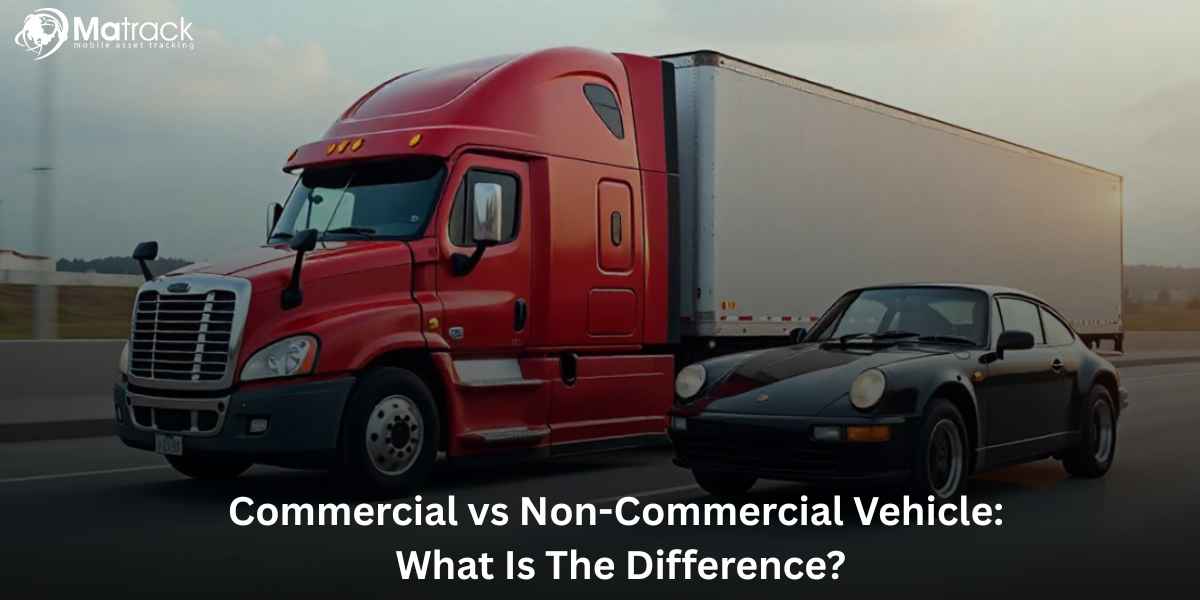Key Takeaways:
- Commercial vehicles are used for earning income through transport or business activities.
- Non-commercial vehicles are used for personal tasks and are not linked to any business.
- Commercial vehicles need special licenses, higher insurance, and follow strict regulations.
- Ownership, usage, and legal rules clearly separate commercial and non-commercial vehicles.
What Is a Commercial Vehicle?
Commercial vehicle is any vehicle used for work, whether it’s moving goods, carrying passengers, or hauling equipment. If it’s part of how someone earns money, it’s considered commercial.
A vehicle falls into this category if it’s used for paid transport or weighs more than 10,001 pounds. It’s usually registered under a business name instead of a personal one.
Read More: What is a Commercial Vehicle?
What Is a Non-Commercial Vehicle?
A non-commercial vehicle is used for personal activities like commuting, errands, or family travel. It doesn’t support any business or generate income.
These vehicles are registered under a person’s name and not a company. Common examples are private cars, family SUVs, and personal pickup trucks not used for work.
Key Differences Between Commercial and Non-Commercial Vehicles
Purpose of Use
Commercial vehicles are operated to generate revenue. For example, a delivery truck used by a courier service or a contractor’s pickup truck carrying tools is categorized as commercial.
In contrast, non-commercial vehicles serve personal transportation needs like commuting, errands, or family outings.
Ownership and Registration
Commercial vehicles are usually registered under a business name. The insurance and registration paperwork often reflect the entity’s name, tax ID, and operating license.
Non-commercial vehicles are registered under an individual’s name with personal identification documents.
Insurance Requirements
Commercial vehicle insurance includes liability, cargo, business interruption, and worker coverage. The premium is higher due to the elevated risk and use frequency.
Non-commercial insurance covers private use, usually at lower premiums and simpler claim structures.
Licensing and Driver Requirements
Operating commercial vehicles often requires special licenses. For instance:
- CDL (Commercial Driver’s License) for large trucks and buses
- Passenger endorsements for carrying multiple people
- Regular medical checks and driving logs
Non-commercial vehicle drivers only need a standard driver’s license, with no additional endorsements or requirements.
Taxation and Deductions
Commercial vehicles qualify for tax deductions under business expense categories. This includes:
- Depreciation
- Fuel
- Maintenance
- Insurance
Non-commercial vehicles do not offer tax deductions, except in rare mixed-use situations.
Legal and Regulatory Considerations
DOT and FMCSA Regulations (U.S.)
Commercial vehicles must comply with Department of Transportation (DOT) and Federal Motor Carrier Safety Administration (FMCSA) regulations. These include:
- Hours of service
- Maintenance logs
- Inspection certificates
Non-commercial vehicles are exempt from most of these regulatory obligations.
Zoning and Parking Restrictions
Commercial vehicles face restrictions on residential parking, especially for overnight stays or large fleet storage. Many cities ban commercial trucks from parking in certain residential zones. Non-commercial vehicles are not subject to these limitations.
Examples of Commercial vs Non-Commercial Vehicles
| Vehicle Type | Commercial Use Case | Non-Commercial Use Case |
| Pickup Truck | Contractor hauling tools | Family road trips |
| Sedan | Ride-share service (Uber/Lyft) | Daily office commute |
| Van | Delivery services (e.g., Amazon) | Transporting kids to school |
| SUV | Off-road adventure tours | Grocery shopping and family trips |
| Truck | Freight logistics | Not typically personal use |



